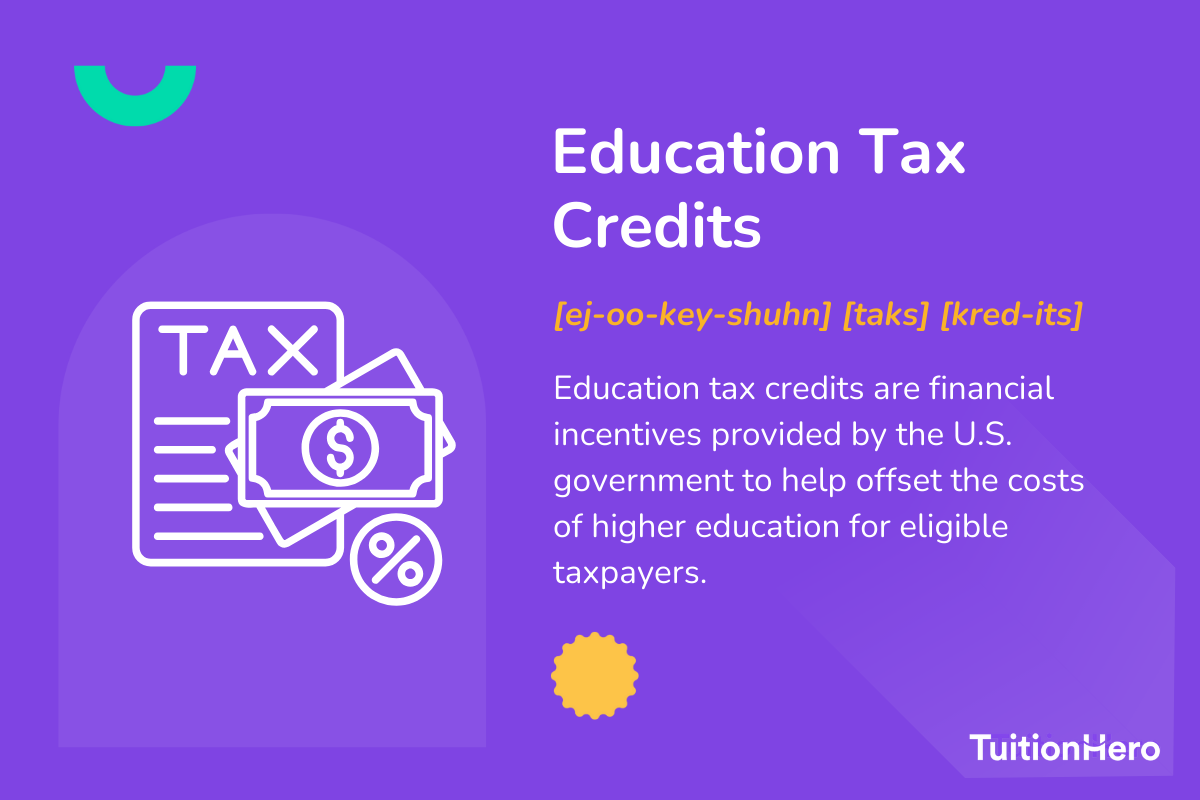Advertiser Disclosure
Last update: November 17, 2024
6 minutes read
What Are Education Tax Credits?
Learn about education tax credits to reduce your college expenses, get essential tips, and save big on taxes.

By Brian Flaherty, B.A. Economics
Edited by Rachel Lauren, B.A. in Business and Political Economy
Learn more about our editorial standards



By Brian Flaherty, B.A. Economics
Edited by Rachel Lauren, B.A. in Business and Political Economy
Learn more about our editorial standards
Are you juggling the cost of education and wondering how they can affect your taxes? Education tax credits could be game-changers for you. These incentives reduce your tax bill dollar for dollar. We'll dive into how these credits work and how you could claim them to keep your hard-earned cash where it belongs – in your pocket.

Key takeaways
- The American Opportunity Credit offers up to $2,500 per student annually, and if it brings your tax bill to $0, you can even get a refund of up to $1,000
- The Lifetime Learning Credit provides a maximum benefit of $2,000 per tax return but does not offer a refund
- While you can claim both credits on your return, you can’t do so for the same student in the same tax year
What are education tax credits?
Education tax credits are special tax benefits designed to offset the cost of higher education. By reducing the amount of tax owed on your return, these credits can help manage the financial burden of tuition, fees, and other related expenses.
If you’re a dependent, you won’t be able to claim these credits on your own tax return. Instead, whoever claims you as a dependent (typically a parent) will be eligible. This article is written from the perspective of an independent filer claiming their own credits, so bear in mind that parents and dependent students will need to make some small adjustments!

How can education tax credits save you money?
In the world of taxes, education tax credits are the holy grail of tax savings. These credits directly reduce the amount you have to pay on your taxes, dollar for dollar. There are two main types to know about: the American Opportunity Credit and the Lifetime Learning Credit.
What is the American Opportunity Credit?
The American Opportunity Credit is a tax credit available to eligible students in the first 4 years of higher education. It provides financial relief by reducing the amount of income tax you owe.
The credit covers qualified education expenses, including tuition, fees, and course materials, and can be claimed for up to $2,500 per eligible student. Additionally, up to 40% of the credit amount (up to $1,000) may be refundable if the original tax credit brings your bill to $0, which means you could end up receiving money rather than owing money.
To qualify for the American Opportunity Credit, you must be pursuing a degree or recognized educational credential, and you must not have claimed the credit for more than 4 tax years.
Your modified adjusted gross income (MAGI) must also be lower than specified limits ($90,000 if single, $180,000 if filing jointly) to be eligible for the full credit. It's a valuable tax benefit designed to ease the financial burden of education expenses during the starting years of higher education.

TuitionHero Tip
Remember, there's no one-size-fits-all way to save for college, and what works for one family might be different for another. Visit TuitionHero.org for personalized advice and tools that suit your unique financial situation.
What is the Lifetime Learning Credit?
The Lifetime Learning Credit is an education tax credit designed to help with the expenses of higher education. Unlike the American Opportunity Credit, it’s not limited to the first 4 years of education and can be claimed for all years of post-secondary education and for courses aimed at learning or improving job skills.
Eligible students, including those pursuing undergraduate, graduate, or professional degrees, can claim a credit of up to 20% of the first $10,000 of qualified education expenses per taxpayer, resulting in a maximum credit of $2,000 per tax return.
To be eligible for the full credit, the same income limits as the American Opportunity Tax Credit apply. The Lifetime Learning Credit, however, is non-refundable, meaning it can reduce your tax liability to $0 but won't provide a refund if the credit exceeds your tax liability.
Qualified education expenses include tuition, fees, and books necessary for enrollment or attendance at an eligible educational institution. Because the higher-limit American Opportunity Tax Credit is typically preferred during undergraduate education, the Lifetime Learning Credit is a valuable tax benefit for people pursuing education beyond the initial 4 years, offering flexibility and support for lifelong learning.
Navigating eligibility for education tax credits
When determining eligibility for education tax credits, it depends on the specific one you're looking at. The AOTC is for students in their first 4 years of higher education who are enrolled at least half-time.
The LLC is more flexible, covering many education pursuits and doesn't have a specific limit on the number of years you can claim it. If you can get the AOTC, go for it, since you can save an extra $500 and even potentially earn a refund!
Both credits have income limits, and you usually can't claim them if someone else claims you as a dependent on their tax return. Making sure you meet this criteria is crucial. Of course, you can only claim these credits against qualified education expenses, like tuition and fees.
Completing the necessary tax forms
When tax time rolls around, you’ll need Form 1098-T to claim either the AOTC or the LLC. This is a form provided by your educational institution showing the tuition you paid during the tax year.
Once you’ve got your form 1098-T, Form 8863 becomes your ticket to actually claiming these education credits. Here, you dial in the figures for your eligible expenses to see the credit you’ve earned. While it might sound challenging, tools like TuitionHero’s can guide you through the process, guaranteeing accuracy and peace of mind.
- Fill out Form 8863 with your educational expenses.
- Attach it to your federal tax return.
- Consider getting step-by-step help from services like TuitionHero.
Compare private student loans now
TuitionHero simplifies your student loan decision, with multiple top loans side-by-side.
Compare Rates
Do’s and don’ts of claiming education tax credits
Navigating education tax credits can be tricky — you’ll want to stay balanced to make the most of them without slipping up. Knowing what to do and what to avoid ensures you don't leave money on the table or find yourself in hot water with the IRS.
Do
Do gather all your educational expense documents before filing.
Do check your eligibility for both credits before deciding which to claim.
Do verify that your institution provides a form 1098-T.
Do consider getting help from a tax professional if you're unsure.
Do use trusted tax software for guidance.
Don't
Don't claim both credits for the same student in the same year.
Don't miss income limits that may affect your eligibility for credits.
Don't overlook the necessary Form 8863 when filing your tax return.
Don't forget that you can't claim credits if you’re listed as a dependent.
Don't provide incorrect information about your educational institution or expenses.
Advantages and disadvantages of education tax credits
Education tax credits bring a mix of perks and pitfalls that can have a big effect on your finances during tax season. Weighing these benefits against the drawbacks is essential for maximizing your tax outcomes and staying on the right side of tax laws.
- Decrease the amount of tax owed, potentially leading to big savings.
- In the case of the American Opportunity Credit, there may be an opportunity for a refund.
- They support continuing education by making it more affordable.
- Income limits can restrict the availability of these credits.
- The complexity of tax laws surrounding education credits can make it tough to navigate without help.
- You can’t claim more than one credit for the same student in a tax year.
- The Lifetime Learning Credit is non-refundable, which means it won’t result in a refund even if it brings your tax liability down to $0.


Why trust TuitionHero
At TuitionHero, we're here to make college affordable for you. We provide information on education tax credits to help you save money on tuition fees. Our financial services, like Private Student Loans and Student Loan Refinancing, assist with upfront costs and managing debt. We also offer guidance on smart credit card use to ensure a solid financial foundation for your future.
Frequently asked questions (FAQ)
If your school doesn't take part in the federal student aid program, you can't get the American Opportunity Credit for your tuition and related costs. It's really important to check if your school is in the program before you count on these credits for your tax return. Don't worry, though; there are other ways to get help with your finances, and TuitionHero is here to guide you through them.
Yes, the Lifetime Learning Credit can be a valuable resource for non-degree seeking students who are taking courses to gain or improve job skills. This tax credit doesn’t require a student to be part of a degree program, making it an excellent option for continuing education and professional development courses.
The income limits for education tax credits can change from time to time. It's a good idea to check the most recent tax guidelines or ask a tax professional for the latest info.
Trusted tax software can also help you figure out if your income qualifies for these credits. And don't forget, if you're dealing with student loans and need some personalized advice, the TuitionHero team is here to help!
Final thoughts
The education tax credits, like the American Opportunity Credit and the Lifetime Learning Credit, are here to help you with the costs of higher education. By using these credits wisely, you can cut down on your tax bill and save some money.
If you need help with FAFSA, dealing with student loans, or figuring out scholarships, TuitionHero is here to guide you. Let's work together to make your education more affordable.
Source
Author

Brian Flaherty
Brian is a graduate of the University of Virginia where he earned a B.A. in Economics. After graduation, Brian spent four years working at a wealth management firm advising high-net-worth investors and institutions. During his time there, he passed the rigorous Series 65 exam and rose to a high-level strategy position.
Editor

Rachel Lauren
Rachel Lauren is the co-founder and COO of Debbie, a tech startup that offers an app to help people pay off their credit card debt for good through rewards and behavioral psychology. She was previously a venture capital investor at BDMI, as well as an equity research analyst at Credit Suisse.
At TuitionHero, we're not just passionate about our work - we take immense pride in it. Our dedicated team of writers diligently follows strict editorial standards, ensuring that every piece of content we publish is accurate, current, and highly valuable. We don't just strive for quality; we aim for excellence.
Related posts
While you're at it, here are some other college finance-related blog posts you might be interested in.
Shop and compare student financing options - 100% free!

Always free, always fast
TuitionHero is 100% free to use. Here, you can instantly view and compare multiple top lenders side-by-side.

Won’t affect credit score
Don’t worry – checking your rates with TuitionHero never impacts your credit score!

Safe and secure
We take your information's security seriously. We apply industry best practices to ensure your data is safe.
Finished scrolling? Start saving & find your private student loan rate today





